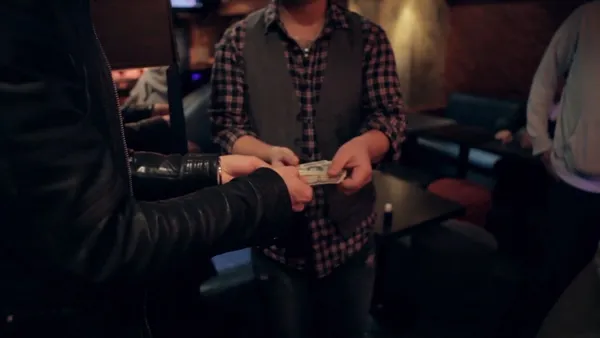Eye For Film >> Movies >> Boys For Sale (2017) Film Review
Boys For Sale
Reviewed by: Jennie Kermode

London, New York, Paris, Hong Kong, Dubai - beyond banking and media, the world's most powerful cities have one thing in common, and that's the ease with which one can purchase sexual access to other people's bodies. In Tokyo there are several laws designed to clamp down on the sex trade, but when they were drawn up the only thng the legislators concerned themselves with was the perceived exploitation of women. In this bustling 21st century metropolis one can still walk into a bar and find, quite openly, boys for sale.
If the term makes you wince, let's start by clarifying that these boys are between the ages of 17 and 30 (the oldest claims he's 26, but colleagues claim it's commonplace to elide a few years if one can get away with it). They're mostly straight, or non-ke. If a customer knows one is gay, he might think he has a chance anyway and not want to pay, so there's value in being straight and everybody has to claim that, they explain. Intrigued by their stories and full of questions about how they could do their jobs without being aroused by male bodies, documentary maker Itako wanted to interview them, but as their time costs money, the only way this could be done was by hiring them. sitting on the beds where they service customers, they talk with surprising candour about the day to day details of their lives.

There are any number of films out there about sex work, but what makes this so interesting for gaijin (non-Japanese people) is the context of the country's historical relationship to sex and the way this interacts with a culture intensely focused on the importance of good manners. Like many parts of the Middle East, Africa and North America, Japan didn't stigmatise homosexuality until it came into context with Western Europe, following which it went through decades of homophobia before looking again at the issue through the lens of an LGBT rights movement widely perceived as a Western import. Unlike most of those other areas, it retained a sex-positive culture focused around traditional fertility rituals, and sometimes its lack of taboos shocks gaijin, but that doesn't mean it'a altogether open. The result of this is that whilst it now has a thriving gay scene, homosexuality remains taboo in polite society, in family discussion and in education. It's still commonplace for gay men to marry women. The bars of traditional red light district Shinjuku 2-chome provide the only outlet for many men's desires.
There are many fascinating consequences of this, and some terrifying ones. Customers will pay just to have a drink with an attractive young man, much as they might once have paid a geisha, and if they want to take things further they will buy him dinner first. The young men working in this environment seem to have a good level of self-esteem, but none are there by choice. Two, if fact, talk about how they ended up there after losing everything to the 2011 earthquake and tsunami. They enjoy the camaraderie of hanging out with other guys their age. It's a job that requires no experience, the drinks are free, and dorm accommodation is provided. But there seems to be little to no training. Even basic things like negotiating one's way out of a bad situation and never allowing oneself to be blindfolded have not been discussed. Two of the men recount instances of rape. Perhaps most worryingly, the majority of them are clueless about STDs, believing that they can be kept at bay by washing or even that they only affect women. Japan has one of the lowest rates of HIV in the world, but it's rising, and they're directly in its path. With antibiotic-resistant gonnorhea now also a threat, one hopes that Itako followed up these interviews with some serious safety tips.
Despite these worrying details, the documentary's subjects do not come across as victims, and many viewers will be impressed by their ordinariness. Some talk about how they hope to get married in the future or move into full time desk jobs. One is hoping for a career in the entertainment industry because he's bisexual and that's one area where he won't be pressured to hide it. They talk about their clients with sympathy and sometimes amusement, reserving contempt for the few who try to abuse them, but what will disabuse many Johns of their illusions is their overriding lack of interest; they have no more curiosity about the owners of the bodies they interact with than computer technicians do about the machines they work on. Even when the sex feels good there is a difference, one explains, between that and liking it.
An intriguing piece of work that captures an underexplored side of modern Japan and provides sex workers with a rare chance to speak for themselves, this is a gem of a documentary, and well worth seeking out.
Reviewed on: 12 Jul 2017















